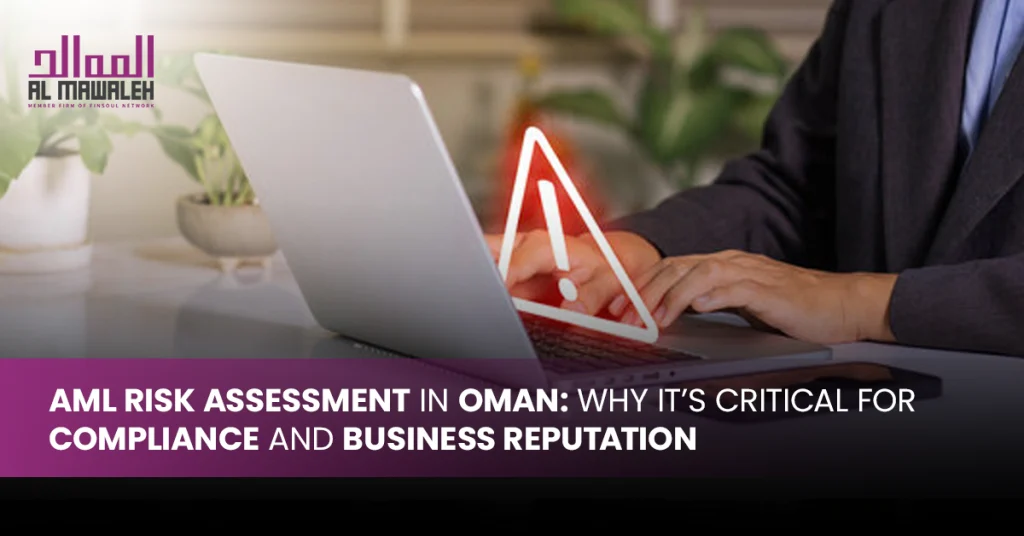- Welcome to Al-Mawaleh
- Majan building , Opposite CSK cafe ,Ghala,Muscat Governorate,Sultanate of Oman

In today’s fast-changing financial environment, no company can afford to ignore money laundering risks. With global regulators tightening their grip and Oman strengthening its compliance framework, conducting a thorough AML risk assessment in Oman has become a business necessity—not just a legal requirement. Companies that fail to comply risk not only fines and regulatory penalties but also long-term damage to their reputation and client trust.
At Al Mawaleh, we understand that managing compliance challenges can feel overwhelming. That’s why we help businesses simplify the process, meet AML regulations in Oman, and safeguard their operations from financial crime while protecting their credibility in the marketplace.
Oman has made significant strides in aligning its regulatory landscape with international standards set by bodies like FATF (Financial Action Task Force). Authorities now expect every organization—whether in finance, real estate, trade, or professional services—to demonstrate an effective system for preventing money laundering and terrorism financing.
The importance of AML compliance in Oman lies in three critical areas:
Simply put, compliance is no longer optional. Businesses that invest in AML systems today are investing in their future stability and credibility.
The AML risk assessment process is the foundation of an effective compliance program. It provides companies with a systematic way to identify, evaluate, and mitigate risks associated with money laundering. In Oman, regulators expect this process to be documented and regularly updated.
Here are the key steps involved:
This cycle ensures that businesses are always a step ahead in identifying vulnerabilities and closing compliance gaps.
The Omani government has been proactive in modernizing its legal and regulatory framework to combat financial crimes. The AML regulations in Oman for 2025 emphasize a risk-based approach, meaning businesses must tailor their compliance programs to their specific risk exposure rather than relying on generic policies.
Key updates include:
These updates mean businesses need a more proactive strategy—paper-based or outdated AML processes will no longer satisfy regulators.
Oman’s strategic location and growing financial markets make it an attractive target for illicit activities. Businesses face a variety of money laundering risks, including:
If left unchecked, these risks not only invite regulatory action but can also harm Oman’s standing in global financial markets. This is why companies are expected to conduct thorough AML risk assessments in Oman to identify red flags early.
A successful compliance strategy isn’t just about meeting minimum requirements—it’s about creating a culture of integrity and vigilance. An effective AML compliance in Oman framework should include:
By embedding compliance into everyday operations, companies demonstrate to regulators, clients, and investors that they take financial crime prevention seriously.
At Al Mawaleh, we provide expert support to help businesses design, implement, and maintain robust AML programs. Our services include:
Our approach goes beyond ticking regulatory boxes—we focus on helping businesses protect their reputation, reduce risks, and operate with confidence.
In today’s interconnected world, reputation is everything. A single compliance failure can go viral, causing irreparable harm to a company’s image. Conducting a strong AML risk assessment in Oman not only keeps regulators satisfied but also strengthens stakeholder confidence.
Investors are more likely to partner with companies that demonstrate strict compliance. Customers prefer doing business with organizations that prioritize transparency and ethical practices. And regulators reward proactive companies with smoother approvals and fewer disruptions.
Simply put—strong AML practices are not just about avoiding penalties; they are a business growth strategy.
The message is clear: effective AML risk assessment in Oman is no longer optional—it’s an essential part of doing business. With stricter AML regulations in Oman, growing money laundering risks, and heightened accountability at all levels, companies must adopt a proactive compliance strategy.
At Al Mawaleh, we believe that strong compliance is the key to building trust, maintaining credibility, and securing long-term business success. By investing in robust AML frameworks today, you not only stay compliant but also future-proof your business against evolving risks.
📞 Contact Al Mawaleh today at +968 7733 8545
🌐 Visit: https://mawaleh.com
Al Mawaleh is a leading financial consultant company in Oman, delivering expert accounting services, professional auditors, and trusted financial solutions advisor support for businesses through top financial consulting firms expertise.